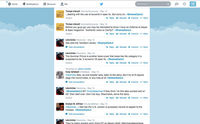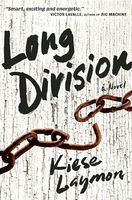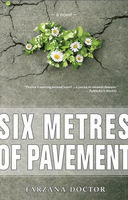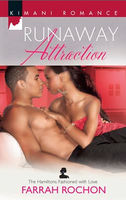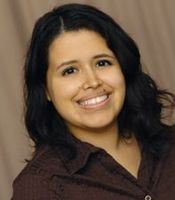Down the Hall: Léonicka Valcius and #Diversecanlit, Part 1
By Evan Munday
If you're new to the world of Canadian literature – heck, even if you're not – you could be forgiven for thinking it's very … well … white. Not just the authors – the staff of publishing houses, as well. Organizations like CWILA (Canadian Women in the Literary Arts) are doing work and counts to shed light on the gender imbalance in Canadian publishing (and reviewing in particular), but what about diversity along other criteria?
Léonicka Valcius is kind of like the anti-David-Gilmour. While he may not have an interest in reading 'Chinese or female authors,' Valcius most certainly is. But she's not content to just read books by different types of authors. Earlier this year, she started organizing Twitter chats under the hashtag #diversecanlit. The aim of these chats is to discuss the issues, challenges, and solutions involved in making CanLit a more diverse enterprise. As she says in her own words, 'Canadian literature is much richer than the statistics would suggest. The stories Canadians tell are diverse and far-reaching. The protagonists come from all sorts of backgrounds and identities. Though it may take a bit of extra time and effort, seeking and reading books written by culturally diverse Canadians is a great way to broaden your understanding of Canada.' And Valcius is practically minded. A representative quotation of hers that led me to contact her about an interview in the first place went a little something like this: 'I don't like to hope. I think it's better to tell them exactly what changes to make and then call out those who refuse to make them.'
I met with Valcius on Tuesday, May 6, to talk about the #diversecanlit chats. If you want to participate, you can join in the Twitter chats every Wednesday night at 8 p.m. (EST). Just use the #diversecanlit hashtag. And this Saturday, May 24, Valcius is hosting her second in-person #diversecanlit meet-up. The first part of our extensive interview follows. The second will be posted the following day.
EVAN: What inspired you to start these Wednesday night Diverse Can Lit chats? Was there a specific moment or instance that made you decide, 'Okay, I've been thinking about this. Let's actually do this.'
LEONICKA: The first time I actually used the hashtag was at BookCampTO. Myself and Natalie Zina Walschots, we did a panel together, facilitating discussion about diversity in Canadian literature. I was thinking if people are tweeting about this or talking about this, what would be the best thing, and I came up with this #DiverseCanLit hashtag. What I found frustrating for me – because that was the second time I had done a talk or panel on that – was that every time you started, it's always at the beginning, right? The first time anybody's talked about it in that setting, so you start at the beginning again. So I wanted a way to build on the conversation. I thought, 'Maybe if there was a whole conference of just that …' and that became overwhelming. Okay, I'm not there yet. But a Twitter chat seemed like a reasonable and relatively manageable thing for me to do. Once a week, use the same tag every week with a different topic that's been scheduled and posted ahead of time.
EVAN: How do you decide the topics for each week?
LEONICKA: I tried to think about the whole publishing process, from start to finish. So, it starts with an idea … this person just has an idea, and they write it, and they edit it with their friends, and they pass it around. And the friends say, 'Maybe you should make this a book.' So, how do you query? Do you choose to query an agent? Do you self-publish? What does an agent do? How does that come about? What's the editor acquiring? So then that leads to editors: we talk about what they do and what their role is. It made sense to me, how at each stage of the process of a book, there's a way for everybody to make a difference. And interspersed in there, I thought about the different genres. Somebody brought up poetry. I know nothing about poetry, but it made me realized maybe each genre does have a specific issue or specific way that diversity affects it. So, we looked at poetry, we looked at middle-grade. We're doing romance this Wednesday, so that'll be fun. Each genre has a different aspect to it. Take romance, for example. It's quite diverse because there are lines for each interest, right? There's LGBTQ books. But are we okay that each preference is segregated?
EVAN: Like why can't there be people of all backgrounds and sexual orientations in pirate romance?
LEONICKA: Exactly, exactly. What was I reading the other day and I was like, 'Wow, this book basically covered all the bigot bases'? It was like, 'Oh, was that your first time with another woman?' and 'Was that your first time with a black person?' I was just like, 'Wow! Wow.' And then again, I try to keep it Canadian-specific, because this is the environment I'm in. So, if you're a romance writer in Canada, what resources do you need to make your life easier? What would make it easier for you if you're writing queer romance? What tools do you need to not feel like this is a hopeless endeavour?
EVAN: So, keeping it local – well, not local, but within the Canadian sphere.
Your CanLit News
Subscribe to Open Book’s newsletter to get local book events, literary content, writing tips, and more in your inbox
LEONICKA: Right. And sometimes, because of the nature of the internet and Twitter and my people who I already follow, there are Americans who jump in. But it's funny, because they always ask, 'Is it okay if I participate in this?' Of course it's okay. Contribute. Just when it's Canadian-specific, when we talk about review culture, I'm probably not going to be talking about The New York Times or the VIDA count. I'm going to talk about CWILA and the Globe and Mail. It's setting up expectations that this is Canadian-specific, it's for Canadians. But if other people have best practices that they want to share, ideas, that's cool, too.
EVAN: Who do you find takes part in these conversations, both in terms of their connection to the world of publishing and where they are, geographically?
LEONICKA: I've found across Canada, I'm getting quite a wider range, and as it's growing there are more Canadians participating. Part of it, too, is I've found that the 8 o'clock time is not so ideal anymore. It doesn't really work on the west coast, because it's just when people are leaving work. So I might have to consider shifting that time or doing various times each week. It's Canadians. It's people who are writing or who are publishing in a small way. So, if they're editors, they're editors of a literary magazine or a small press or they were editors of something. Reviewers, bloggers. And, of course, the people in my network who are interested in diversity in the U.S. also contribute.
EVAN: Are you finding fewer people who are working at bigger houses? Or is that unfair to assume?
LEONICKA: I haven't seen much engagement from the five co-pubs, if that's the question, but I don't think it's, 'Oh, we're going to ignore this thing that's happening.' I wouldn't say that. When I purposely tag – not individuals, because I think that's rude – but when I sometimes tag organizations, they always respond and are always very open. We had a conversation about book festivals and conferences, and what was great about that was I don't pretend I know everything. I was talking about livestreaming and how that's a really great way to get people who can't necessarily get to a festival. My assumption was that if you're not in a big city, there aren't a lot of literary festivals that come by. And everybody was like, 'What are you talking about? I'm in such-in-such town, we have a great festival!'
EVAN: Yeah. 'I'm in Elora.'
LEONICKA: I know. I said, 'I'm sorry, I'm sorry. I was wrong. I'm so sorry.' And then, when I did the Storify on that one, because I mentioned the Inspire! Festival, they said, 'That's great, we'll keep this information in mind.' Last week, when we were talking about editors, I asked, is there a way to train editors to think consciously about slurs and addressing them in their notes to the writers? Saying, 'This is a slur. Try not to use that.' So, I said, 'What if the Editors Association of Canada offered workshops in this?' And they replied, 'We actually do. Here's a link.' That was information that I was then able to share to everyone in the conversation. That was cool.
EVAN: What's your personal connection to Canadian book publishing? How are you involved in that world outside of these chats?
LEONICKA: I work at Scholastic Book Fairs … um, my opinions are my own … (Laughs.) But I work at Scholastic Book Fairs. I do French book buying for their K-6 French books. That's what I do. And I haven't really touched on francophone publishing as of yet. I think because that's almost a separate – it feels very separated from English publishing in Canada. And I just don't have the network for it. So I think that's a goal. As my network develops and more people are like, 'Hey, I'd like to talk about this and I'm knowledgeable about this …' (Laughs.) Because when the poetry thing came up, I was like, 'Okay, that's great. That's a great discussion. But can you do it? Because I don't even know what questions to ask.'
EVAN: That's cool. So you're getting more and more guest moderators on topics you feel less familiar with?
LEONICKA: Well, I'll try. And if there's no guest, that's fine. I'll just ask questions. Because then I get the answers. But I think that's the goal, eventually. As it grows, have other guests do it.
EVAN: Speaking of goals, I know relatively recently, you had an in-person meet-up. And it sounds like you have another one Saturday, May 24, later this month. What did you find that the in-person conversations added to things?
LEONICKA: I always think it's useful to take things offline. The walls have ears online, right? So, you can only say so much. And there are limitations. I like Twitter because it reminds me of forums where you can just back-to-back ideas. But it's not a forum. You've got 140 characters. And it's very short, bite-sized. And you can't take the time to think through your entire process. So, you say a thing and before the person even replies, you're like, 'Oh, actually, I don't think that makes any sense.' But it's too late. Three people have already responded and told you all the ways you're wrong. I think it's sometimes useful to take it offline and just talk, and just be a bit more informal. And get to know each other a little bit better. Because another goal of this is to connect people who are already doing the work. Connecting people who say, 'Hey, this is a project I'm working on. I'm stuck because of such-and-such a thing. Have you ever encountered that problem? What did you do? Do you know someone who could help me?' That's the kind of vibe I'm hoping develops.
There was an agenda, but it was mostly, 'What are you up to? What are your goals? What are you doing offline?' Because I don't want this to be, 'Oh, I do this Twitter chat and that's my contribution for the week.' It's like, 'Congratulations, you talked about it on Twitter again.' One person, she was working on her blog and decided to open submissions from diverse readers. She was going to give priority to books that promote diversity, put those to the top of her list. Which is really cool. I didn't know that. I don't review books. It takes a lot of work. But now I can redirect people. And another guy, he does work with bringing in authors. He brought in Kiese Laymon (Long Division) to Toronto, and they did an author talk and it was really chill and small, but it was a starting point. And he wants to develop that and make it a series. In person, it can be more about developing relationships. Whereas online, it's more theoretical – what are the issues? What is this problem? How can we fix it? Whereas in person, it's like what are you actually doing.
EVAN: I think even now, studying Canadian literature in high school and even, to some extent, at universities, there's an overwhelming sense of, 'Hey this is mostly written by mostly white, mostly dead, mostly male authors.' Going way back, what's the first Canadian book you read that made you realize these aren't all written by dead white guys? That there's this whole panoply of different backgrounds and perspectives?
LEONICKA: This is awful, but I didn't grow up in Canada. I grew up in the U.S. So, I didn't do CanLit in high school or any of that. I read The Handmaid's Tale by Margaret Atwood – got it out of the library in high school – and I was like, 'Oh my God, this is great.' Didn't know she was Canadian. And we read Carol Shields in our World Lit class, and I adored that book [The Stone Diaries]. Didn't make the connection. I mean, I knew she was Canadian because it was a World Lit class but I didn't really make a connection. And then once I was in my publishing course, I thought, 'Oh, I'm going to work in this industry. I should probably figure out who these people are!' I hadn't read most of the Canadian literary canon. And I did have that sense that it was mostly white men. Or mostly middle-class. And I still sometimes have that perception, especially when I'm trying to talk to other people. I think people often say, 'I don't read CanLit because it doesn't speak to me at all. There's really no reason. It's not marketed toward me.'
EVAN: It's not even trying to appeal to me.
LEONICKA: Right. It's not even trying. A lot of the commercial fiction is not labeled CanLit if it's Canadian, I find. So, okay. The things that many people would pick up aren't considered Canadian Literature. And the things that are considered Canadian Literature are kind of narrow. So, I'm still having trouble convincing people who are skeptics of why they should no longer avoid it. That being said, I read Six Metres of Pavement [by Farzana Doctor] and that was fantastic. I think there was a line about it – about this squelching mud on King's College Circle at U of T, and I was like, 'Oh my God! Yes, yes. Exactly! And you have ten minutes to get to class and your shoes are ruined.' That was like, okay, she gets it. And Carmen Aguirre's Something Fierce. I adored it. I thought it was fantastic. And I felt it was great that it was being labeled 'Canadian Literature.' Because it was different and was about a woman's experience not in Canada. It wasn't, 'Here's how Canada made my life wonderful.' It was, like, 'Here was my life before Canada.' I appreciated that. And Brown Girl in the Ring [by Nalo Hopkinson], I always talk about that. I took a moment and said, 'Hey, these books really don't appeal to me; I need to find other books.' So I started doing that. Finding things like The Headmaster's Wager by Vincent Lam – that's fantastic – but most recently, A Tale for the Time Being by Ruth Ozeki. As I made that effort, I quickly found fantastic books. So I cling to those. They're the ones that don't make me feel like an outsider!
EVAN: (Laughs.) I think it's funny because 'CanLit' -– it should, as a term, just mean anything published by Canadian authors but it does have this sense that it's, like, a genre.
LEONICKA: Right!
EVAN: Even a book like Nalo Hopkinson's – she's probably one of the best and one of the better-known Canadian writers – but I think you would even have to argue with some people to have it considered CanLit because it is sci-fi-ish or fantasy.
LEONICKA: Yes! Right. I like genre fiction. I like sci-fi, fantasy. I like romance. I like historical fiction. Those are the genres I go to. So, I find it so weird– okay, if we're looking for Canadian sci-fi, you kind of have to dig, and it's usually a small press that's taking a stand by saying, 'You know what? I'm going to do this whether you like it or not, Canada.' I think ChiZine comes to mind. But that's a whole other issue. I used to get really excited about saying, 'Harlequin is Canadian.' So that counts as Canadian literature! Now, I can't even say that. I'm really sad!
EVAN: You're interested in Diverse Can Lit, not just in terms of, say, the authors or the subjects, but also the staff at these publishing houses. What issues do you think presses face in the effort to have staffs that are more representative of Canada's population as a whole?
LEONICKA: I think really it's admitting there's an issue. Canada has this reputation and this story that we tell ourselves as Canadians that we're really progressive and really equal and we treat everyone fairly. We're not bigoted. We're not racists. And so, we assume that everything's okay, that everything is fair. When it's not. And to say that to someone gets their back up. They're like, 'What do you mean? My best friend's black!' Right? But it's more than that. It's a system. Editors and agents say they want diverse books, and then authors send them their books and they say they like the writing, but there's no market. Or they don't connect. That's a valid reason to reject a book, in my opinion. I think, as an agent, you have to connect with the work. And as an editor, you want to feel that the work has its merits. The problem comes if all the editors come from generally the same background, they're biased toward a certain story. There are things that I will never understand or experience or get, and that's okay. But I can't assume that that's the same with everybody else. If you're an editor, and you're like, 'Well, I don't get it, and I don't know who would purchase this. None of my friends would buy it' Or they wouldn't buy it for their kids. That's fine, but if you're only friends with people from the same socio-economic strata, they're all generally the same walk of life, then, yeah, you won't know the person who will buy it. I think that's why it's important to diversify the staffs. To get different perspectives. Maybe the person who does 'get' your book, maybe they'll reject it, too. That's okay. Maybe it's just not good. That's completely valid. But there need to be enough different perspectives that I can pass this along. Like, 'I don't get this, but maybe you will connect with it more. Or maybe you will.' And we're different enough that it's valid. That we're not just passing it around amongst ourselves.
As far as obstacles go, I think it comes down to a lack of self-awareness. In terms of the counts, for instance, many organizations have never done such a count, whether it be of reviews of their publishing list, saying, 'Okay, let's look at what we've published in the last five years. What's your percentage?' They don't do that. There was an article that said, 'How will I know if the people submitting are of a certain background or not?' You could ask. I know Silvia Moreno-Garcia, she runs Innsmouth Free Press in B.C., and in her submissions guidelines, she says to self-identify. She says, let me know if you identify as native, Metis, or Inuit. Let me know if you are under 30, because she prioritizes younger authors. And let me know if you're – I think she uses the Census labels because it's difficult – how do you identify? It's an imperfect system but you've got to start somewhere. So she knows exactly who has submitted. And I think it's worth doing that. It's worth taking that moment to see what am I doing correctly, what can I do to make it better. I mean, I beat that drum of, 'Be diverse! Read diverse fiction!' And then I looked at my bookshelf and thought, 'Oh, crap. I guess I should … be diverse and read diverse fiction.' You don't know how bad it is until you actually take the time to look. You have to make it a priority to look.
Follow the #diversecanlit Twitter chats every Wednesday night at 8 p.m. (EST). And join in the in-person #diversecanlit meet-up this Saturday, May 24. Check back with Open Book Toronto tomorrow for Part 2!
The views expressed in the Writer-in-Residence blogs are those held by the authors and do not necessarily reflect the views of Open Book: Toronto.
The views expressed in the Writer-in-Residence blogs are those held by the authors and do not necessarily reflect the views of Open Book.
Evan Munday is the author and illustrator of the acclaimed book series for young readers, The Dead Kid Detective Agency. Both The Dead Kid Detective Agencyand its sequel, Dial M for Morna, were nominated for the Silver Birch Fiction Award.
Evan has worked in book marketing and publicity for ten years, eight of which were as publicist at Coach House Books, and he has since worked as a freelance illustrator and ebook designer.
Find out more about Evan on his website, idontlikemundays.com or follow him on Twitter at @idontlikemunday.
